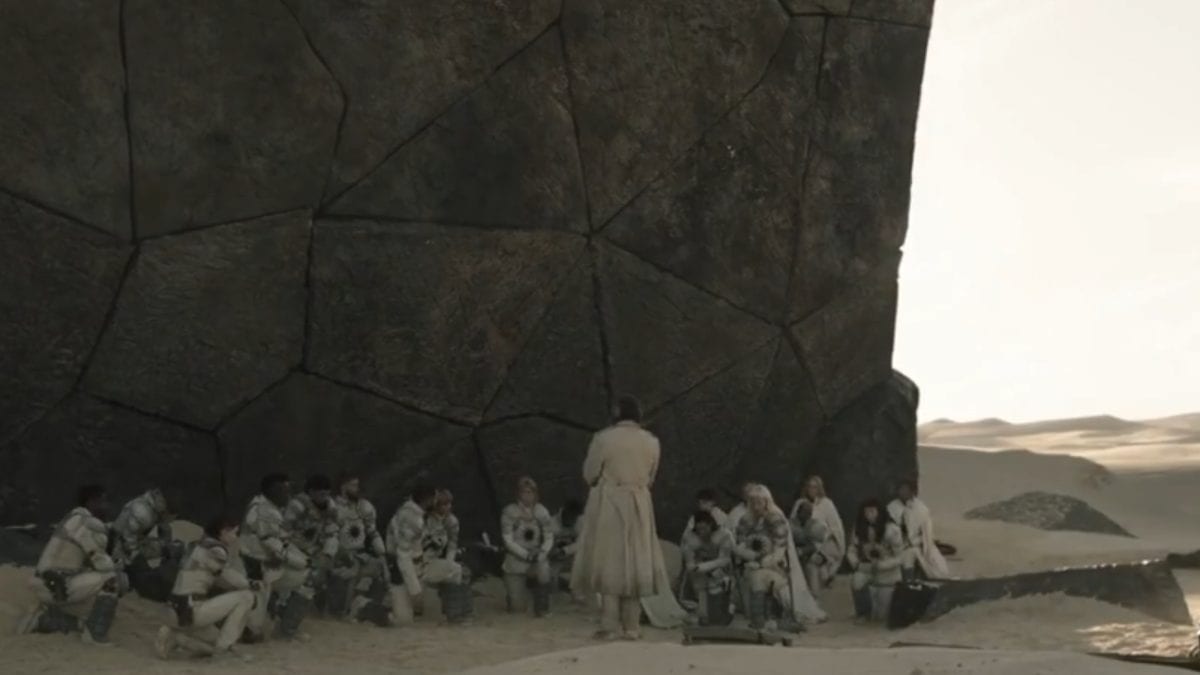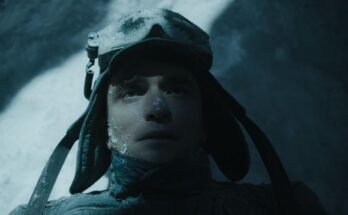Want to hear more from the actors and creators of your favorite shows and films? Subscribe to The Cinema Spot on YouTube for all of our upcoming interviews!
Managing editor & film and television critic with a Bachelor's of Arts in English Literature with a Writing Minor from the University of Guam. Currently in graduate school completing a Master's in English Literature.
“It’s time to sleep now.” Raised by Wolves‘s fourth episode is titled “Nature’s Course,” written by series creator Aaron Guzikowski and directed by Luke Scott.
Some spoilers ahead for those who have not yet seen this episode or the previous episodes of the series. If you have not done so, get to that now, then return to this article!
A great episode of HBO Max’s newest science fiction series is here, and we need to discuss it. “Nature’s Course” focuses on the show’s characters as they each debate in their respective subplots whether someone or something must die. A creature that Father (Abubakar Salim) had captured in the previous episode is kept in a shed of the compound, and Mother (Amanda Collin) places its fate in his hands. Later, Campion (Winta McGrath) and Father search for food for the family to eat. Meanwhile, as they continue their search for the lost children, Marcus (Travis Fimmel) and Sue Drusus (Niamh Algar) deal with Eminence Ambrose (Steve Wall), who is out of line as the Mithraic survivors’ leader, even more so when they approach a mysterious stone structure.
The Drusus couple’s son Paul (Felix Jamieson) tells the other children of Mother saving him from the crater. Hunter (Ethan Hazzard) and Campion discuss different reasons — logical and spiritual — for why Paul was saved; Hunter tells the children that while their parents may be deceased, they will always be watching. Campion asks Paul if his pet Mouse functions the same way, but Paul says, “Animals don’t go anywhere when they die. Death is the end of them.” Campion then spots Father crafting a spear to kill the creature, to which the boy responds with an option, that is, of searching for food rather than killing a living organism as a source of food. He says, “Death is forever when you’re an animal,” although his android parent argues, “Death is forever for all organic lifeforms.” This may be a wild statement to make, which parallels that of current events and the movements of modern times. Father does not care for Kepler-22b’s creature but considers the lives of other living organisms, those that are not currently endangered.
Tempest (Jordan Loughran) has a tough time accepting her womanly role as a human. Mother tells her, “You are a creator, whereas all I’ll ever be is a creation.” The android fixes the synthetic womb sacks to help the girl, who was “impregnated against her will.” Father expresses his concern for Tempest’s post-traumatic stress and tells Mother not to let science get in the way, that she should “let nature take its course,” but she believes different.
Believing he is inadequate in his role in the family (and even Mother admits this to Tempest), Father tries to redeem himself as the children’s patriarchal figure by teaching them to kill. When searching for food, Campion hits a bundle of potential food off of a tree — going so far as to name it “pizza” — only to discover that it is toxic with hydrocyanide. Later, Father tries to convince Campion to take the creature’s life. He says, “It will take practice to get over the revulsion [that] the act will trigger, but those feelings will dissipate with practice … it’s part of growing up.” The boy refuses this and decides he would rather stay young, to which Father adds, “Goodness will not fill your stomach.” In the end, Campion’s parent says something that might stick out the most regarding death: “[It] can be very unpleasant when you’re intelligent.” Father later has a confused vision of Tally (Grace Li), foreshadowing her possible survival.
On the Mithraics’ side of the story, the Drususes are told, “The children aren’t meant to be rescued. We can’t jeopardize our holy mission because we’re too weak to sacrifice the things we love.” This is another reckless statement made about making personal beliefs get in the way of what is moral. Sue’s allegiance to her adopted belief system is tested with a line from a lullaby, which she thought to have come from a religious scripture: “The sun has sunk, the shadowy night is raining in your room. We pray to Sol, a saving light to guide us through the globe.” Marcus is betrayed and nearly killed, and later, he uses the aid of the Mithraics’ god Sol to bring justice to the traitor.
This episode’s musical scoring is superb, especially towards the end with Tempest doing what needs to be done, only to realize that solving the family’s problem only makes matters worse. Collin’s performance as Mother is excellent, noting that we should never ignore her first experience in the Mithraic simulation. Her final stance on death is one worth considering: “It is nature, and nature is flawed.”
What do you think of the series? Have you seen the show yet? Let us know! For more science-fiction, drama, HBO Max, and Raised by Wolves-related news and reviews follow The Cinema Spot on Twitter (@TheCinemaSpot) and Instagram (@thecinemaspot_).
Managing editor & film and television critic with a Bachelor's of Arts in English Literature with a Writing Minor from the University of Guam. Currently in graduate school completing a Master's in English Literature.






10 Comments on “‘Raised By Wolves’ S01E04 Review – “Nature’s Course””